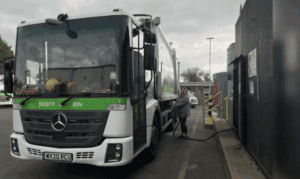Waste collection lorries powered by biofuels

Reigate and Banstead Borough Council announced that the vehicles are now running on hydrotreated vegetable oil (HVO), a renewable diesel alternative, which is expected to reduce emissions from each truck by at least 76%.
According to the council, this change will prevent around 500 tonnes of carbon from being released into the atmosphere annually — roughly equivalent to the amount of electricity needed to power up to 500 flats for a year.
Hannah Avery, the council’s executive member for neighbourhood services, said the move would lower the operational carbon footprint of the waste fleet by at least 25%, calling it a “significant step” toward achieving the authority’s net-zero target by 2030.
She added that the council is also working on plans to replace the remaining vehicles with electric or other low-carbon alternatives in the future.
HVO, produced from waste materials like used cooking oil, is regarded as a cleaner and more sustainable substitute for fossil fuels. Ms Avery highlighted that the switch would not only cut emissions but also improve local air quality, describing the decision as a “socially and environmentally responsible investment.”
The initiative follows the council’s approval of plans in December 2023 to reduce emissions from its waste collection fleet.













